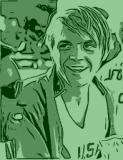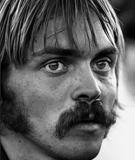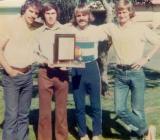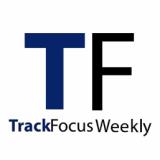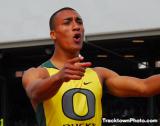For the past three seasons, the annual Oregon-Oregon State football game has been played for Rose Bowl-or-better stakes.
Keep in mind that this rivalry game, the oldest on the West coast, has usually held little significance outside the boundaries of the state. For decades, the game was the biggest college football day of the year only because there was little else for Ducks and Beavers fans to look forward to (with a smattering of exceptions).
I thought I knew a thing or two about the Civil War game. I studied the history of the rivalry one fall by spending countless hours in the basement of a library searching newspaper microfilms as far back as 1893. I wrote game-by-game summaries that have appeared in the Corvallis Gazette-Times and The Oregonian.
But until four days ago, I never heard of any connection between this game and Steve Prefontaine.
That’s where Steve Bence comes in. The longtime Nike employee, a friend and former teammate of Pre’s at Oregon, sent me this story. It details a Prefontaine race that until now is almost completely unheard of.
More than 36 years later, this story fires imaginations. It is part of Oregon sports lore. As far as I know there is no documented video or photo. It exists only in the memories of the few who took part, and possibly the football fans in Corvallis for the 1974 Civil War game.
Here is Steve Bence’s telling:
The Great Race was an annual fraternity fundraiser for Muscular Dystrophy. It alternated Corvallis-to-Eugene in the odd years and Eugene-to-Corvallis in the even years.
The race was timed to finish in the football stadium (Parker Stadium) during halftime of the Civil War. In order to accomplish this all but the last four miles were run on Friday and the race resumed during the second quarter on game day.
In 1974, I was asked to run on the Oregon team by one of my friends in a fraternity. I must have agreed because the race included a few hours on a bus, with sorority girls and beer. It wasn’t a serious race. It was a fun Friday event. There weren’t many rules and we could decide as we went who would run, in which order, and how far.
People started to party as they completed their run. However, I turned competitive as the Oregon State team pulled ahead and their bus disappeared into the distance. I worked out a plan where several of us would rotate running about a quarter mile at a time and we would dramatically increase our pace. It worked. The Oregon State bus came back into view and we gradually reeled them in. By the end of Friday we were 67 seconds behind.
That evening I followed up on the rest of the plan, which was to convince three of my Oregon track teammates to run the last four miles on Saturday with me. I was a 4:02 miler. It was easy to talk my roommate Mark Feig and future Olympian Matt Centrowitz into running. They were both sub-four milers.
I called Pre, a 3:54 miler, to be our anchor leg. He said no. We had a Saturday morning track workout and he didn’t want to run again in the afternoon. I explained that it was a fundraiser, it would finish in the Oregon State football stadium at halftime, he would be our anchor, and I guaranteed that he would be on the winning team.
The race format was confusing to him. I was about to give up when he asked how many teams there were. Just two: Oregon and Oregon State. He then asked who was ahead by 67 seconds. I told him, “Oregon State.”
That was enough for Pre. He agreed to run. There was no way that Oregon State was going to win if he had the opportunity. Oregon football was in the midst of a bad season and was going into the Civil War a heavy underdog with a 2-8 record. Pre loved the thought of Oregon winning a running event in Corvallis, in full view of Beavers fans, and in view of the loser Oregon football team.
Once again, I promised Pre that by the time he received the baton that he’d be in the lead. Mark, Matt, and I would make up the 67 seconds plus more since were running against a bunch of frat guys.
After our Saturday morning track workout the four of us got together and drove to starting point in Corvallis. To my surprise, the four runners from Oregon State were from their track team as well. Their anchor was freshman Rich Kimball, who ran about 4:02 in high school.
Uh, oh.
Pre asked me about my guarantee that he’d have a lead at the handoff. I looked to Mark and Matt, who both offered thumb’s-up. But making up more than 20 seconds per mile proved to be too much.
I watched for Pre’s reaction as he received the baton about 15 seconds behind Rich Kimball. I was prepared for him to refuse to run. Instead, Pre grabbed the baton, glanced my way, flipped me off, and then looked ahead to Kimball. I could tell in his eyes that he was going to run great but I didn’t know if the 15 second gap would be too much, especially after the morning track workout.
Mark, Matt, and I hopped in the car and sped off to the stadium to watch the finish. We had only a few minutes to park the car, run in, and then talk our way onto the field.
The stadium announcer briefly explained the Great Race and directed attention to the end zone where any moment the runners would enter the stadium. No one expected Prefontaine. Yet suddenly, there was Pre bursting through the tunnel about a stride ahead of Rich Kimball.
They both sprinted down the middle of the football field as the teams were preparing to start the second half. There was a murmur in the crowd and the announcement came that Oregon’s Steve Prefontaine was winning the Great Race. He won the approximately 40-mile race by two seconds.
Pre was ecstatic. He was presented with the trophy, which was supposed to go to the fraternity of the winning team.
On the drive back to Eugene, we told the stories of our run. Pre loved beating the Beavers in Corvallis, and he wanted his competitiveness to rub off on the football team. The Beavers beat the Ducks that day 36-16. He probably thought that they were lazy prima donnas, unlike us track guys.
When we got back to Eugene I tried to get the trophy back from him to give to the fraternity. Pre said that it was going on his mantle for a little while and that he’d deliver the trophy later.
A month later, during the Christmas holiday, I went to Pre’s house and noticed the trophy still on his mantle. I told him that I needed to be returned. He said, “Not yet.”
The next spring, on May 29, 1975 to be specific, we had a track meet on a Thursday evening. Pre had trouble relaxing for so many hours before the race so he insisted that Mark, Matt, and I go to his house to play cards. As we prepared to leave, Pre realized that the four of us from the Great Race were together. He grabbed his camera, ran next door to ask his neighbor to take a picture, the four of us stood in his front yard with the trophy. Finally, Pre was then ready to let go of it.
We went to the track meet.
Hours later Pre died.
Months after Pre’s death, someone developed the film in his camera and delivered a copy of the picture, which I forgot existed. It was a wonderful surprise.
I’m not sure what happened to the trophy but I know it meant something to him. Pre was a multiple NCAA champion, American record holder, and an Olympian. Yet winning that race on that day in the manner that he did was a great example of Pre’s character and competitiveness.
- Steve Bence




